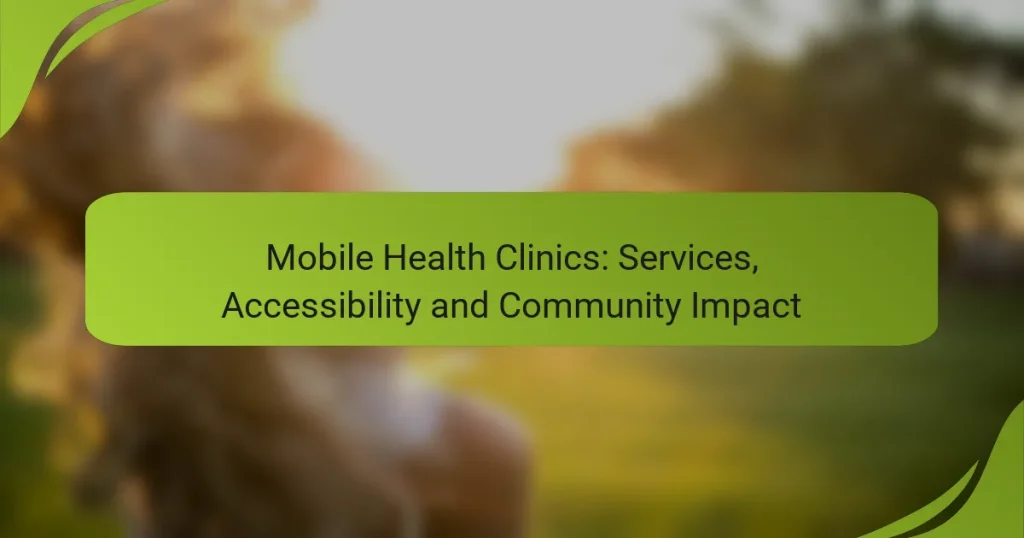Mobile health clinics play a crucial role in delivering essential medical services directly to underserved communities, effectively bridging the gap in healthcare accessibility. By offering services such as primary care, preventive screenings, and mental health support, these clinics ensure that individuals can receive the care they need without the burden of long travel distances. Their presence not only improves health outcomes but also fosters trust and enhances health literacy within the communities they serve.
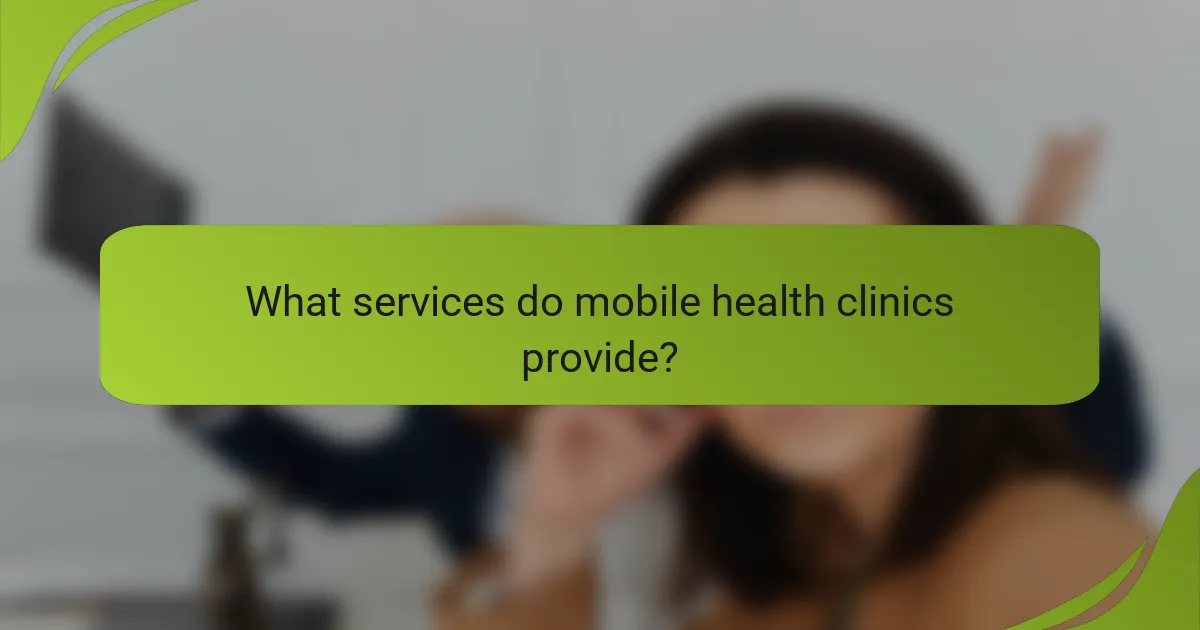
What services do mobile health clinics provide?
Mobile health clinics offer a variety of essential medical services directly to communities, particularly in underserved areas. These clinics aim to improve access to healthcare by bringing services like primary care, preventive screenings, and mental health support closer to patients.
Primary care services
Mobile health clinics typically provide primary care services, including routine check-ups, diagnosis, and treatment of common illnesses. Patients can receive care for acute conditions such as infections or minor injuries without needing to travel to a traditional healthcare facility.
These clinics often have a team of healthcare professionals, including physicians, nurse practitioners, and physician assistants, who can address a wide range of health concerns. This convenience helps reduce barriers to care, especially for those with limited transportation options.
Preventive health screenings
Preventive health screenings are a key service offered by mobile health clinics, helping to identify health issues before they become serious. Common screenings include blood pressure checks, cholesterol tests, and diabetes screenings.
By providing these services, mobile clinics encourage early detection and management of health conditions, which can lead to better health outcomes. Many clinics also offer education on lifestyle changes that can prevent chronic diseases.
Mental health support
Mobile health clinics often include mental health support as part of their services, addressing the growing need for accessible mental health care. Services may include counseling, therapy sessions, and referrals to specialized providers.
These clinics aim to reduce stigma and improve access to mental health resources, particularly in communities where traditional services may be lacking. By offering confidential support, they help individuals manage stress, anxiety, and other mental health challenges.
Chronic disease management
Chronic disease management is another critical service provided by mobile health clinics, focusing on conditions such as diabetes, hypertension, and asthma. Clinics offer regular monitoring, medication management, and education on self-care practices.
By supporting patients in managing their chronic conditions, mobile clinics help reduce hospitalizations and improve overall quality of life. They often provide resources and tools to empower patients to take charge of their health.
Immunizations and vaccinations
Mobile health clinics play a vital role in delivering immunizations and vaccinations, particularly in communities with limited access to healthcare. They provide routine vaccinations for children and adults, including flu shots and COVID-19 vaccines.
These clinics often collaborate with local health departments to ensure compliance with vaccination schedules and public health guidelines. By making vaccines easily accessible, they contribute to community health and help prevent outbreaks of vaccine-preventable diseases.
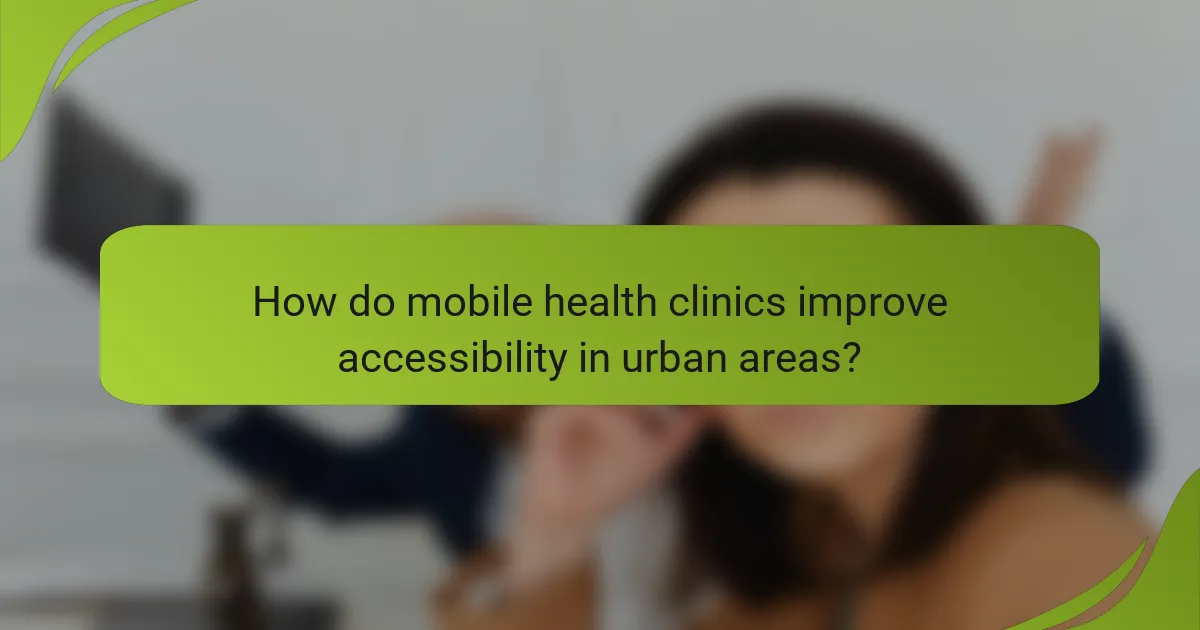
How do mobile health clinics improve accessibility in urban areas?
Mobile health clinics enhance accessibility in urban areas by bringing essential health services directly to underserved populations. They eliminate the need for patients to travel long distances, making healthcare more reachable for those with limited transportation options.
Reduced transportation barriers
Mobile health clinics significantly reduce transportation barriers by providing services in neighborhoods where residents may lack easy access to traditional healthcare facilities. This is particularly beneficial for low-income individuals or those without reliable public transport, as they can receive care within walking distance.
For example, a mobile clinic might set up in a community park or local school, allowing residents to visit without the need for a car or lengthy commutes. This convenience can lead to higher rates of attendance for routine check-ups and preventive care.
Flexible scheduling options
Mobile health clinics often offer flexible scheduling options that accommodate the varied schedules of urban residents. Many clinics operate during evenings or weekends, making it easier for working individuals or families to access healthcare services without disrupting their daily routines.
This flexibility can be crucial for those who might otherwise miss appointments due to work commitments or childcare responsibilities. By aligning service hours with community needs, mobile clinics increase the likelihood that patients will seek and receive necessary care.
Targeted outreach programs
Targeted outreach programs are a key feature of mobile health clinics, focusing on specific populations that may be at higher risk for health issues. These programs often include health education, screenings, and vaccinations tailored to the unique needs of the community.
For instance, a clinic might partner with local organizations to provide services to homeless individuals or immigrant populations, addressing barriers such as language and cultural differences. By proactively reaching out to these groups, mobile clinics can improve overall health outcomes and foster trust within the community.
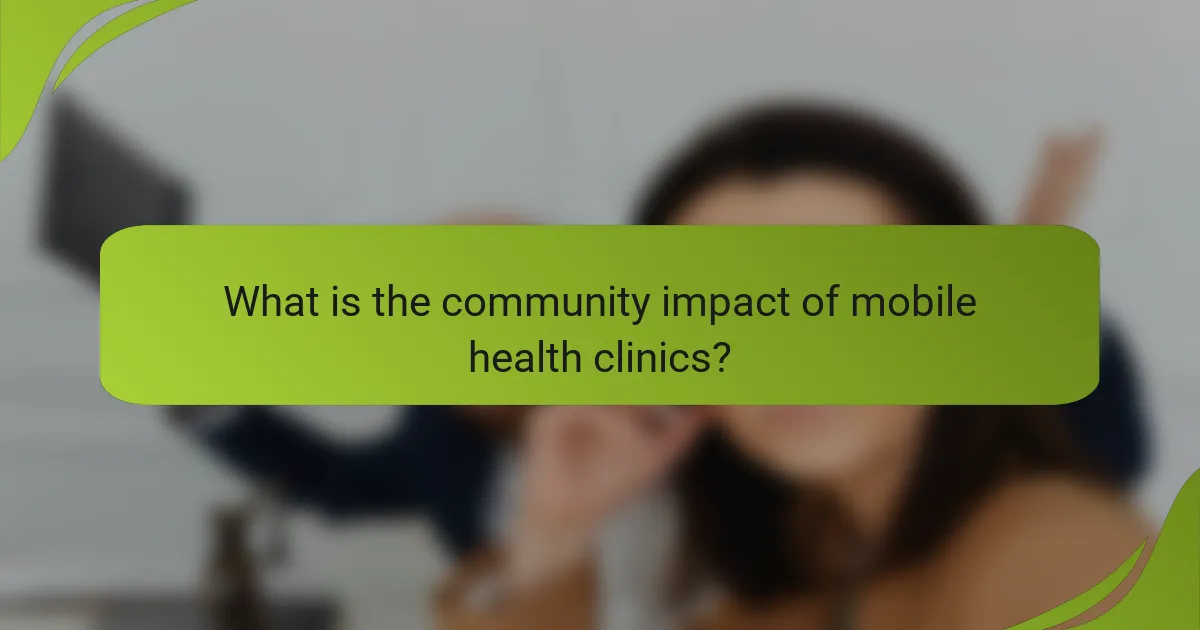
What is the community impact of mobile health clinics?
Mobile health clinics significantly enhance community health by providing accessible medical services, improving health literacy, and fostering trust between healthcare providers and local populations. Their presence can lead to better health outcomes and increased awareness of health issues within underserved areas.
Increased health awareness
Mobile health clinics play a crucial role in raising health awareness by offering educational resources and preventive services directly to communities. They often conduct health screenings, vaccination drives, and informational workshops that inform residents about common health issues and preventive measures.
For instance, clinics may provide information on chronic diseases such as diabetes and hypertension, encouraging individuals to seek regular check-ups and adopt healthier lifestyles. This proactive approach helps communities become more informed about their health and the importance of early intervention.
Enhanced health outcomes
By delivering essential healthcare services directly to underserved populations, mobile health clinics contribute to improved health outcomes. They often address barriers such as transportation and cost, making it easier for individuals to receive timely medical attention.
For example, studies have shown that communities with mobile health services experience higher rates of immunization and screenings for conditions like cancer and heart disease. This increased access can lead to early detection and treatment, ultimately reducing the prevalence of serious health issues.
Strengthened community trust
Mobile health clinics help build trust between healthcare providers and the communities they serve. By consistently engaging with residents and addressing their specific health needs, these clinics foster a sense of reliability and support.
Trust is further enhanced when healthcare professionals from the community are involved in the clinics, as they understand local cultural nuances and health concerns. This connection encourages individuals to seek care without fear of stigma or discrimination, leading to a more cohesive community health environment.
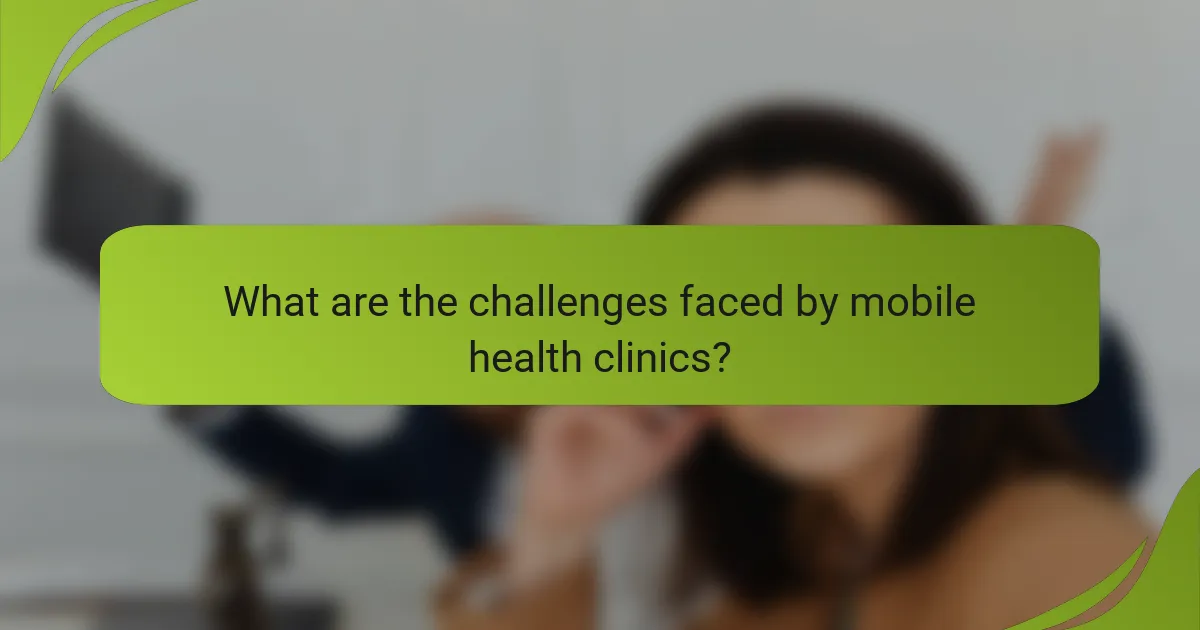
What are the challenges faced by mobile health clinics?
Mobile health clinics encounter several challenges that can hinder their effectiveness in delivering healthcare services. Key issues include funding and resource limitations, regulatory compliance, and staffing shortages, all of which can impact their ability to operate efficiently and reach underserved populations.
Funding and resource limitations
Funding is a critical challenge for mobile health clinics, as they often rely on grants, donations, and government support. Many clinics operate on tight budgets, which can restrict their ability to purchase necessary medical equipment or supplies.
Resource limitations can also affect the range of services offered. For instance, clinics may not have access to advanced diagnostic tools or specialized personnel, which can limit their capacity to address complex health issues effectively.
Regulatory compliance issues
Mobile health clinics must navigate a complex landscape of regulations that vary by state or country. Compliance with health and safety standards, licensing requirements, and insurance regulations can be time-consuming and costly.
Failure to meet these regulatory requirements can result in fines or the suspension of services. Clinics need to stay informed about changes in legislation that may impact their operations, which can be a significant burden for small organizations.
Staffing shortages
Staffing shortages are a prevalent issue for mobile health clinics, often due to limited funding and the demanding nature of the work. Recruiting qualified healthcare professionals can be challenging, especially in rural or underserved areas.
Clinics may also face high turnover rates, which can disrupt continuity of care and lead to gaps in service delivery. To mitigate this, clinics should consider offering competitive salaries, flexible work schedules, and opportunities for professional development to attract and retain staff.
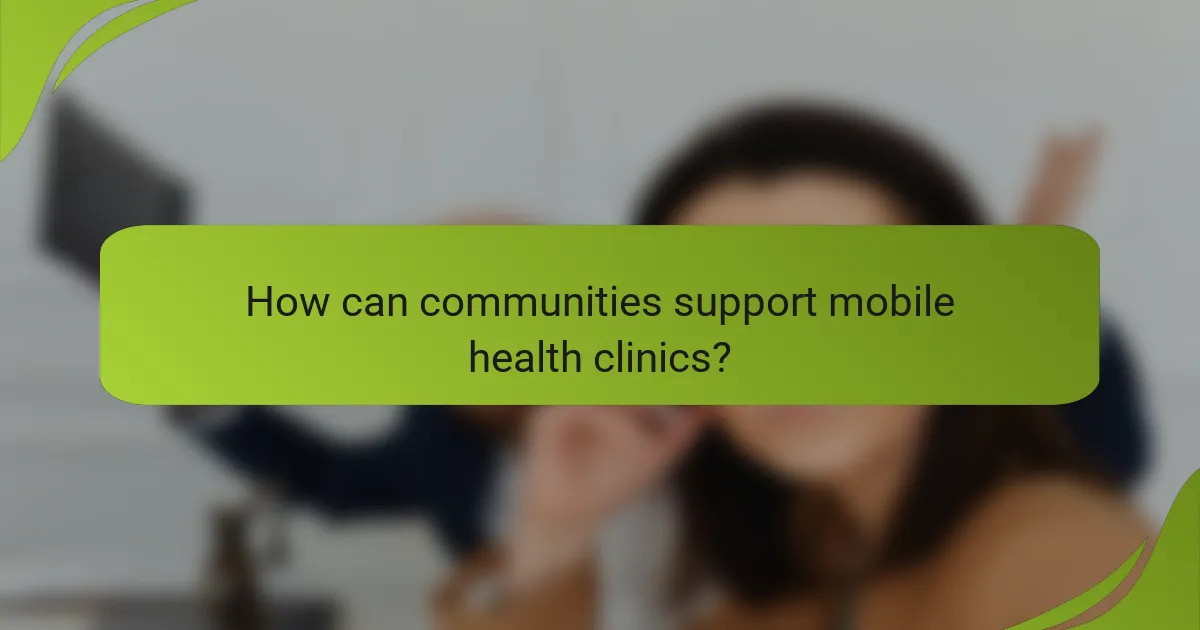
How can communities support mobile health clinics?
Communities can support mobile health clinics by engaging in volunteer efforts and forming partnerships with local organizations. These actions enhance the clinics’ ability to provide essential health services and improve accessibility for underserved populations.
Volunteer opportunities
Volunteers play a crucial role in the operation of mobile health clinics, assisting with patient intake, administrative tasks, and outreach efforts. Individuals can contribute their time and skills, whether through direct patient interaction or logistical support.
Community members can find volunteer opportunities by contacting local health organizations or visiting the clinics directly. Many clinics offer flexible schedules, allowing volunteers to participate according to their availability.
Local partnerships and sponsorships
Forming partnerships with local businesses, nonprofits, and government agencies can significantly enhance the resources available to mobile health clinics. These collaborations can provide financial support, in-kind donations, or shared facilities for service delivery.
Communities should seek to establish sponsorships that align with the health clinics’ missions. For instance, local pharmacies might offer medication supplies, while health-focused nonprofits could assist with outreach and education efforts.
